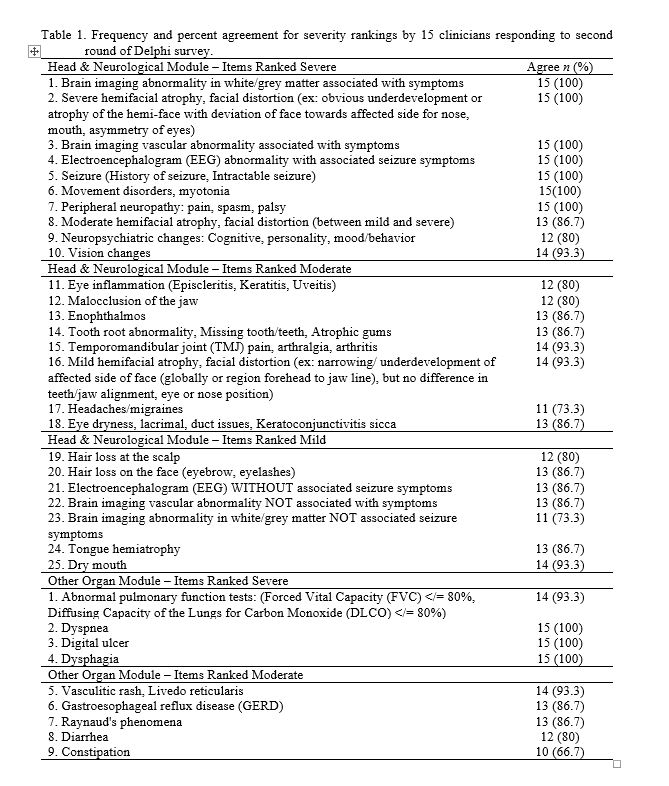Session Information
Date: Friday, March 31, 2023
Title: Poster Breakout 4 - JDM & Scleroderma: Clinical & Therapeutic Aspects
Session Type: Breakout Session
Session Time: 4:30PM-5:00PM
Background/Purpose: Juvenile localized scleroderma (jLS) is a rare condition causing inflammation and fibrosis that may impair health-related quality of life (HRQoL). Recent studies demonstrate extracutaneous manifestations (ECMs) are common and associated with poorer HRQoL, but current measures fail to capture this complexity. The Total Morbidity Score (TMS) is a weighted measure that scores both cutaneous damage and ECMs, providing a total score for disease morbidity.1 Before this score can be used in clinical settings, there is a critical need for coordinated, international partnerships to obtain consensus on the weighting scheme within certain modules.
Methods: A virtual, modified Delphi process is being utilized to refine the weighting scheme for the Head and Neurological (HN) and the other organ (OO) modules of the TMS, building upon prior work.1 Experienced jLS rheumatologists and dermatologists were recruited from CARRA, PReS, and PRINTO, and two of 3 planned survey rounds administered in REDCap. In the first round, clinicians were asked to rank the items within each module in terms of severity (5 – extremely severe to 1 – not severe). In the second round, clinicians were presented with the results from round 1 and asked to confirm the severity classifications for items within the modules. Consensus was defined a priori as >70% clinician agreement.
Results: Eighteen clinicians (12 female) representing 13 countries completed the first survey with 15 also completing round 2. All items reached consensus on severity rankings except for constipation (OO module; with 5/15 disagreement with classification as ‘moderate). Reasons provided by clinicians for disagreement on this item included the high frequency of constipation in the non-jLS population, the challenge of attributing this symptom specifically to jLS, and the variation in severity. Also in round 2, participants were asked what additional information would help them determine the severity level (severe, mild, moderate) for the following items: seizure (history of, intractable), brain imaging abnormality in white/grey matter associated with symptoms, vision changes, and headaches/migraines. These responses will be used in round 3 to determine if greater clarity regarding ECM descriptions is needed when scoring/weighing these items on the TMS.
Conclusion: In survey round 2, all items but one reached pre-specified thresholds for consensus on severity rankings. A third, final round of the modified Delphi process is currently underway to operationalize the TMS scoring approach, including item weightings and additional categories for certain items (e.g. seizures). Refined weighting of TMS HN and OO domain subscores will enhance the utility of this measure for clinicians, researchers, and international collaborations.
References 1. Li S, Patel A, Pope E,… Laxer R. Capturing the Range of Disease Involvement in Localized Scleroderma: The Total Morbidity Score [abstract]. Arthritis Rheumatol. 2020;72.
 Table 1. Frequency and percent agreement for severity rankings by 15 clinicians responding to second round of Delphi survey.
Table 1. Frequency and percent agreement for severity rankings by 15 clinicians responding to second round of Delphi survey.
To cite this abstract in AMA style:
ZIgler C, Henke D, Pain C, Lythgoe H, Ardalan K, Torok K, Li S. International Validation of the Total Morbidity Score for Juvenile Localized Scleroderma: 2023 Update [abstract]. Arthritis Rheumatol. 2023; 75 (suppl 4). https://acrabstracts.org/abstract/international-validation-of-the-total-morbidity-score-for-juvenile-localized-scleroderma-2023-update/. Accessed .« Back to 2023 Pediatric Rheumatology Symposium
ACR Meeting Abstracts - https://acrabstracts.org/abstract/international-validation-of-the-total-morbidity-score-for-juvenile-localized-scleroderma-2023-update/
